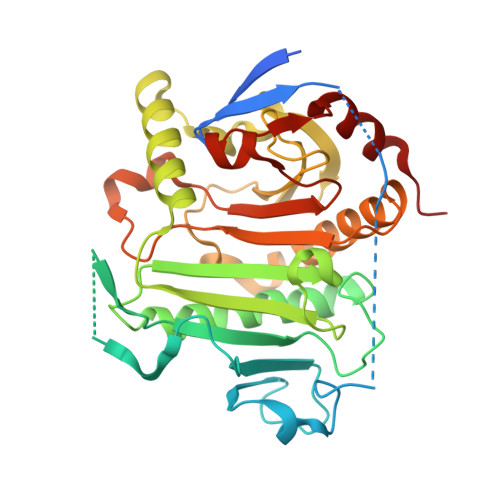Structure and Mechanism of an ADP-Glucose Phosphorylase from Arabidopsis thaliana
MCCOY, J.G., ARABSHAHI, A., BITTO, E., BINGMAN, C.A., RUZICKA, F.J., FREY, P.A., PHILLIPS JR., G.N.(2006) Biochemistry 45: 3154-3162
- PubMed: 16519510
- DOI: https://doi.org/10.1021/bi052232m
- Primary Citation of Related Structures:
1Z84, 1ZWJ - PubMed Abstract:
The X-ray crystal structure of the At5g18200.1 protein has been determined to a nominal resolution of 2.30 A. The structure has a histidine triad (HIT)-like fold containing two distinct HIT-like motifs. The sequence of At5g18200.1 indicates a distant family relationship to the Escherichia coli galactose-1-P uridylyltransferase (GalT): the determined structure of the At5g18200.1 protein confirms this relationship. The At5g18200.1 protein does not demonstrate GalT activity but instead catalyzes adenylyl transfer in the reaction of ADP-glucose with various phosphates. The best acceptor among those evaluated is phosphate itself; thus, the At5g18200.1 enzyme appears to be an ADP-glucose phosphorylase. The enzyme catalyzes the exchange of (14)C between ADP-[(14)C]glucose and glucose-1-P in the absence of phosphate. The steady state kinetics of exchange follows the ping-pong bi-bi kinetic mechanism, with a k(cat) of 4.1 s(-)(1) and K(m) values of 1.4 and 83 microM for ADP-[(14)C]glucose and glucose-1-P, respectively, at pH 8.5 and 25 degrees C. The overall reaction of ADP-glucose with phosphate to produce ADP and glucose-1-P follows ping-pong bi-bi steady state kinetics, with a k(cat) of 2.7 s(-)(1) and K(m) values of 6.9 and 90 microM for ADP-glucose and phosphate, respectively, at pH 8.5 and 25 degrees C. The kinetics are consistent with a double-displacement mechanism that involves a covalent adenylyl-enzyme intermediate. The X-ray crystal structure of this intermediate was determined to 1.83 A resolution and shows the AMP group bonded to His(186). The value of K(eq) in the direction of ADP and glucose-1-P formation is 5.0 at pH 7.0 and 25 degrees C in the absence of a divalent metal ion, and it is 40 in the presence of 1 mM MgCl(2).
- Department of Biochemistry, University of Wisconsin, Madison, Wisconsin 53706, USA.
Organizational Affiliation:

















